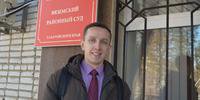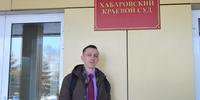The case of Kuznetsov in Vyazemsky
Filter
- #
At about 9 a.m. in the city of Vyazemsky, the head of the branch of the FSB of Russia in the Khabarovsk Territory, Captain Alexei Svetachev, and senior warrant officer of the FSB Andrei Kusov, with two witnesses, searched the home of 29-year-old Sergey Kuznetsov, the uncle of Yegor Baranov, against whom a case for faith had been initiated 4 months earlier. Flash drives, notebooks with personal notes, printed publications, the Bible and electronic devices are seized from Kuznetsov. The believer is handed a summons for interrogation to the investigator of the Investigative Department of the FSB of Russia in the Khabarovsk Territory S. V. Nemtsev.
- #
D. S. Pozdnyakov, senior investigator-criminalist of the Khabarovsk Territory Directorate of the FSB, initiates a criminal case against Sergey Kuznetsov. It is separated from the case of Ilya Degtyarenko.
Sergey is charged under Part 2 of Article 282.2 of the Criminal Code of the Russian Federation, he is charged with participating in meetings with fellow believers, during which he read and quoted texts from the Holy Scriptures.
- #
At 8 o'clock in the morning in the apartment of Sergey Kuznetsov, who was absent at that moment, a second search was carried out, authorized by the judge of the Central District Court of Khabarovsk, Lilia Maltseva. The search is supervised by Khabarovsk FSB investigator S. Nemtsev and Captain Alexei Svetachev, head of the Vyazma branch of the FSB, who had previously organized criminal prosecution of other Jehovah's Witnesses in the city.
In Kuznetsov's house are the parents and sister of the believer. The operatives, not believing that Sergey is missing, begin investigative actions from his room. They ask if there is a Bible or other religious literature in the house. The search takes place in a calm atmosphere, without pressure on the owners. The security forces seized mobile phones of Sergey's relatives, flash drives returned from the first search, as well as personal records of the believer. A copy of the search protocol is not given to the family, Sergey and his sister are summoned for interrogation.
- #
Sergey Kuznetsov comes to the FSB for interrogation, where he learns that he is a suspect in a criminal case. He uses Article 51 of the Constitution of the Russian Federation, which gives him the right not to testify against himself and his loved ones.
During the interrogation, investigator Nemtsev tries to establish a connection between Sergey and other believers. His phone is seized. Kuznetsov is taken to sign a not to leave.
- #
Sergey Kuznetsov is included in the list of extremists of Rosfinmonitoring, which means blocking all his bank accounts.
- #
Senior investigator of the Khabarovsk Territory Directorate of the FSB of Russia, Captain of Justice D. Pozdnyakov attracts Sergey Kuznetsov as a defendant in "participation in the activities of a religious organization, in respect of which the court decided to liquidate and ban activities in connection with the implementation of extremist activities."
Kuznetsov is accused of "participating in video conferences, choosing material for study ... took an active part in commenting and discussion, summed up the lessons, as well as ... He created a positive motivation for this, initiated ritual communication - reading prayers, singing songs (psalms), showed videos to students.
The investigation also believes that "the activities of the meeting of the religious organization Jehovah's Witnesses in the city of Vyazemsky are characterized by stability, expressed in the regularity of meetings of its members ... in the realization of common goals - serving Jehovah, following and putting into practice the doctrine."
- #
For consideration on the merits, the case is sent to the Vyazemsky District Court of the Khabarovsk Territory. It is appointed to Ksenia Ostanina.
- #
The Vyazemsky District Court begins hearings on the merits. Sergey Kuznetsov petitions for the termination of the criminal case. Judge Ksenia Ostanina rejects the petition.
At the next hearings, it is planned to interrogate witnesses and the defendant, as well as study the case materials.
- #
Interrogation of prosecution witnesses who attended worship services of Jehovah's Witnesses in 2018.
The prosecutor confuses the concepts of "organization" (legal entity) and "worship meetings", asking the following questions: "What events did you participate in this organization? Did someone organize your participation in this organization?"
Witnesses deny that the services raised issues related to the call for the overthrow of the state system, incitement of national and religious hatred, and the use of Nazi symbols.
One of the interrogated named the topics that were raised at the services, for example, how to behave in the family, in society, to show respect for the authorities and people of different nationalities.
- #
The court refuses to merge the cases of Sergey Kuznetsov and Yegor Baranov.
- #
Yen Sen's wife Lee is being interrogated. She says she feels unwell after the funeral of her husband, who died three weeks ago. She uses Article 51 of the Constitution of the Russian Federation and confirms the testimony she gave earlier.
- #
Interrogation of a prosecution witness who attended worship services of Jehovah's Witnesses for 20 years, but until 2017. He has nothing to say about the case and does not understand why he was summoned. The defendant Sergey Kuznetsov objects to the disclosure of the testimony of the witness, because he does not know him, and the prosecutor's questions do not relate to the merits of the case.
- #
A witness is being questioned. He does not confirm the testimony given during the preliminary investigation. According to him, law enforcement officers put pressure on him, threatening to open a criminal case.
He also points out that some words were added to the interrogation record by the investigator. At the same time, the witness emphasizes that the defendant did not call for extremism, but, on the contrary, encouraged respect for the authorities.
- #
One of the witnesses is being interrogated, a woman on whose testimony the investigation based the accusation against Yegor Baranov. She says she does not know the defendant personally. The court asks her questions that are not related to the case of Sergey Kuznetsov.
- #
Interrogation of prosecution witness Ekaterina Leičunas. She points out that she testified under duress while reading the text prepared by the investigator on camera.
Sergey Kuznetsov reminds the court that coercion to testify is a criminal offense under Article 302 of the Criminal Code of the Russian Federation.
- #
The court examines another prosecution witness. He says that he does not know the defendant, and when asked by the judge "what do you know about the circumstances of the case?" he replies that he does not understand why he was invited to the hearing.
- #
Interrogation of a man who attended worship services of Jehovah's Witnesses until 2018. He states that he did not hear any calls for aggression from the defendant.
- #
The prosecutor requests for Sergey Kuznetsov 3 years of imprisonment in a colony and 1 year of restriction of freedom.
- #
Sergey Kuznetsov makes his final statement. "I am honored to be called a Christian, and I strive to imitate Jesus Christ," he declares.
The last word of the defendant Sergey Kuznetsov in Vyazemsky - #
Referee: Ksenia Ostanina. Vyazemsky District Court of the Khabarovsk Territory (Vyazemsky, Kozyukov St., 4).
- #

